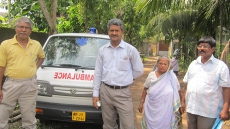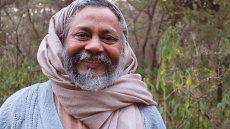In 2016, Anil Srivatsa and his family ventured on an epic overland journey called the Gift of Life Adventure, from Bangalore to Scotland, covering 15 countries and 30,000 kilometres in 90 days, all for the purpose of creating awareness on organ donation.
India is in a dire need to amplify its existing pace of organ donation to save more lives and prevent deaths occurring due to non-availability of donated organs. The country sustains some of the lowest rates of organ donation in the world largely due to myths, superstitions, societal restrains, and lack of awareness on the subject. Nearly 500,000 individuals die annually in India due to acute shortage of organs. An obviously striking demand is only able to generate a supply of 0.5 per cent of deceased organ donors, as per the 2015 report by the International Registry in Organ Donation and Transplantation.
“India traditionally doesn’t look at organ donation as a very viable social thing to do,” says Anil Srivatsa, live organ-donor, adventurist, cross-border campaigner, and CEO and co-founder of Radiowalla Network Pvt. Ltd. in Bangalore, India. A kidney donor, Srivatsa has been leading an organ donation campaign of a unique kind across various borders by targeting a crucial component – triggering dialogue on organ donation within families.

“What happens is, you are a donor at home, you haven’t told your immediate family and after you die, they don’t know because you don’t talk about it and that’s a waste. I’m addressing that portion of it with my efforts because if somebody opens and talks in their family, you don’t need to sign up with anybody.”
In 2014, Srivatsa’s older brother approached him for a kidney donation, and although organ donation had been practiced in his family before – Srivatsa’s father and grandfather were both eye donors – the decision to donate one kidney had been a bit of a struggle. “I struggled with the idea of doing it but I did it nonetheless and after that I saw that life doesn’t really change after you give a kidney. I had the fear that what will happen to me after I give it. Best way to find out was to do it and I found out nothing happens to me. Only good things happen to me.”
And good things he has certainly been experiencing and helping come true for others as well. In 2016, Srivatsa took his wife, daughter and son, on an epic overland journey called the Gift of Life Adventure (GOLA), from Bangalore to Scotland, covering 15 countries and 30,000 kilometres in 90 days, all for the purpose of creating awareness on organ donation. In the course of this journey in Norway, Srivatsa was made aware of an application that gathers organ donors and this triggered the founding of The Million Donor Project, an app sharing a donor’s decision to donate his/her organ/s, with the family. “I felt awareness is not enough, action is more important,” says Srivatsa, who is aiming to sign up one million donors on The Million Donor Project app.

In July, the GOLA team recorded another milestone with the successful kidney transplant of an 18-year-old boy from Afghanistan, Malik, who travelled to Bangalore for surgery with his two brothers – one of them being the kidney donor. From helping raise funds to leading the battle against State Transplant Committee for a swifter transplant approval, Srivatsa and his team stood strong next to the Malik brothers throughout the journey. In many ways, the case underlined a crucial gap that exists in both nations when it comes to organ transplant surgeries. While Afghainstan needs to invest in training doctors for such procedures, India must tackle red tapism endangering lives of patients such as Malik.
Srivatsa describes the Afghan boys as the inspiration behind GOLA Foundation which he recently launched to raise funds and support organ transplants for children and women. “There is a gender bias and age bias when it comes to children and women because they don’t feel their life’s worth enough to spend the money in a family. There are a lot of women that end up not getting a surgery in spite of having a donor because nobody wants to pay for it.”
But why such a reluctance in discussing organ donation at home? What are the conflicting factors? The media broadcaster talks elaborately on the matter. He explains, “From a donation [and] charitable perspective, it’s easier to feed the poor and then you are rewarded with a smile, its tangible. But this (organ donation) is so intangible, they don’t think it’s worth thinking about right now.” What makes the situation worse is the discomfort associated in discussing death at home, and this Srivatsa states is a gap which extends beyond India. “Nobody wants to talk about this stuff at home. How else are you going to talk about organ donation if you don’t talk about death? Death is not something anybody talks about. It’s inevitable, they know it but talking about it is a problem.”

Srivatsa emphasises that communication with family and support from them is crucial – one of the reasons why he ventured on the Gift of Life Adventure with his family. “My decision to give my organ donation was because my family consented to it. The law requires my wife to consent, my wife didn’t consent. But my children talked to my wife and made her understand that it’s OK and that’s how my wife consented. So it was a decision we all made together.”
Regardless of whether you are in India, or abroad, you can transform multiple lives by supporting Srivatsa and his multiple efforts by signing up for organ donation. To do more than just knowing, visit GiftofLifeAdventure.com/signup, download the app, and trigger a conversation within your family.


